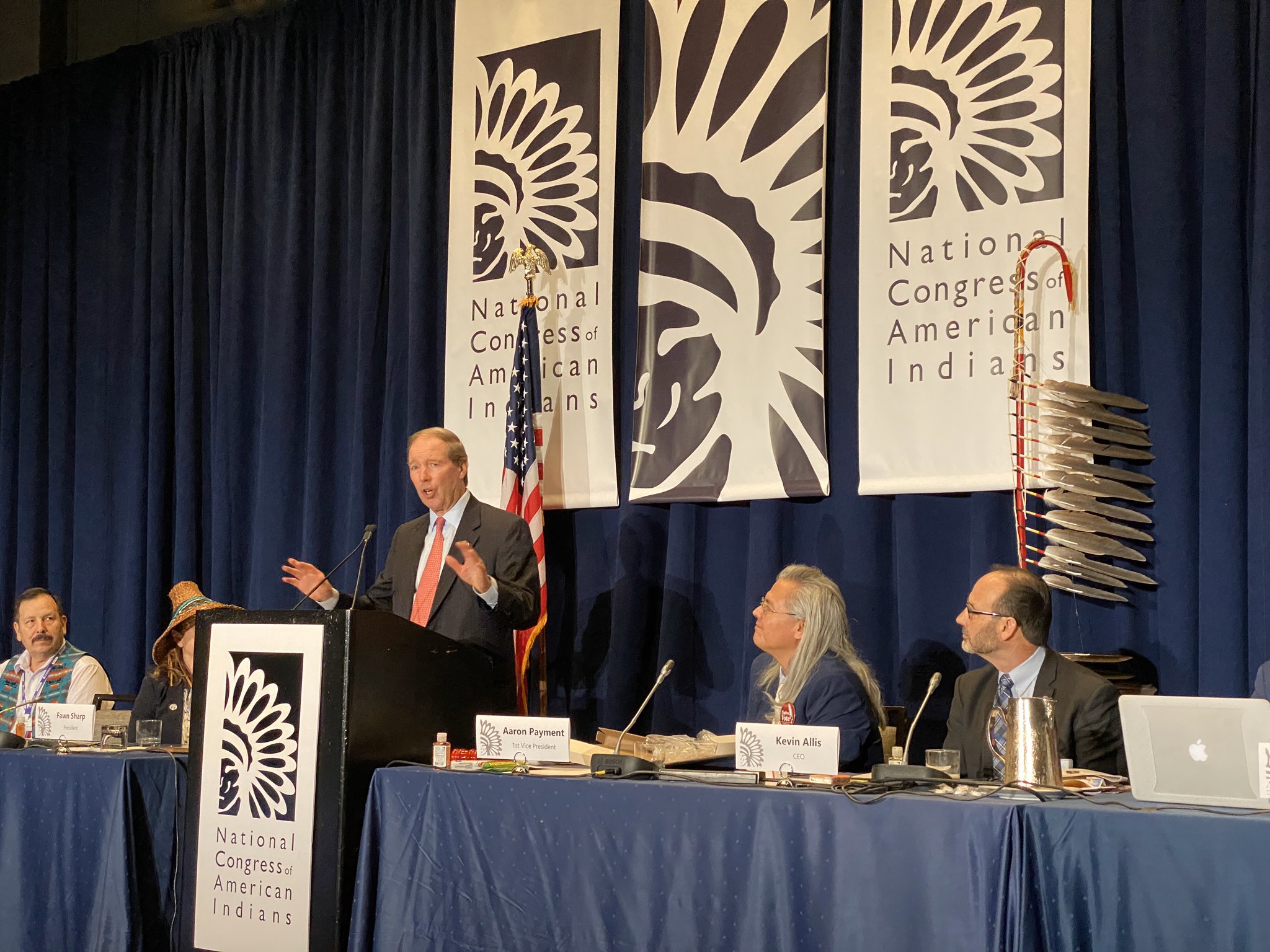
For Immediate Release
March 25, 2020
Udall Statement on Tribal Provisions in Senate Bipartisan Emergency COVID-19 Relief Package Compromise Agreement
Udall, Senate Democrats secured important improvements to meet the unique COVID-19 related needs of Native communities
Udall renews call for Tribal-specific title in future COVID-19 stimulus packages
WASHINGTON –U.S. Senator Tom Udall (D-N.M.), vice chairman of the Senate Committee on Indian Affairs, issued the following statement on the improvements to the third COVID-19 emergency relief package that Senate Democrats secured to address the unique needs of Indian Tribes and urban Indian health programs:
“Tribes are on the front lines of this public health crisis, and they have been very clear that they need health, economic, and community COVID-19 recovery resources. That is why I’ve pushed for inclusion of Tribal-specific resources and policies,” Udall said. “I’m proud that I was able to work with my Senate Democratic colleagues to fight for important Tribal-specific provisions to improve this urgent legislation. We stood with Indian Country to secure an $8 billion Tribal government relief fund to provide 574 Indian Tribes with the flexible resources they need for COVID-19 response and economic recovery. The compromise will also provide over $2 billion in emergency supplemental funding for programs at the Indian Health Service, Bureau of Indian Affairs, the Bureau of Indian Education, and HUD’s Office of Native American Programs.
“No doubt – these are key victories. But the fight to make sure Indian Country isn’t left behind in the federal response to the coronavirus pandemic must continue. Congress must do more to respond to the unique COVID-19 related public health and economic crises in Indian Country and to uphold our trust and treaty responsibilities to all American Indians and Alaska Natives. As vice chairman of the Senate Committee on Indian Affairs, I’m renewing my call for our next response package to include a Tribal-specific title, and for pushing Congress and the Trump administration to make sure Indian Country has equal access to federal coronavirus resources.”
The bipartisan Senate agreement will establish an $8 billion Tribal Government Relief fund to ensure Indian Tribes have direct “one stop” access to COVID-19 resources for economic recovery and continuation of essential government services based on local needs.
The agreement also contains over $2 billion in emergency supplemental funding for Indian Tribes, urban Indian health programs, and Native communities, including:
- $1.032 billion for the Indian Health Service, with significant funds put in the field through Tribal shares and urban organizations;
- $453 million for operation of essential Tribal government programs funded through the Bureau of Indian Affairs, like public safety and purchase of protective equipment for emergency personnel;
- $69 million for the Bureau of Indian Education.
In addition to working with Senate Democratic Leadership to prepare a number of Tribal health and economic proposals in response to the COVID-19 pandemic, Udall has championed the COVID-19 related needs of Indian Country.
- Udall led a bipartisan group of 27 senators in writing a letter to Vice President Mike Pence requesting the administration meaningfully engage with Native communities and Tribal leaders on their COVID-19 response.
- Udall introduced the CDC Tribal Public Health Security and Preparedness Act, legislation to allow Tribes to apply directly to the Centers for Disease Control and Prevention (CDC) public health emergency preparedness (PHEP) program and authorize the CDC to make any necessary modifications to the program to fit the needs of Tribal applicants.
- Udall joined U.S. Senator Elizabeth Warren (D-Mass.) in introducing the Tribal Medical Supplies Stockpile Access Act, legislation that would guarantee that the Indian Health Service (IHS), Tribal health authorities, and urban Indian organizations have access to the Strategic National Stockpile (SNS).
###
Indian Health Service Announces New Deputy Director for Quality Health Care and Enterprise Risk Management (Indian Health Service)
Federal Emergency Management Agency (FEMA)
White House Office of Management and Budget (Joe Biden Administration)
Tuba City Regional Health Care Corporation (Arizona, Navajo Nation)
Oklahoma City Indian Clinic (OKCIC)
Indian Health Service (Department of Health and Human Services)
Navajo Nation Town Hall (Arizona, New Mexico, Utah)
Navajo Nation (Arizona, New Mexico, Utah)
Tribal organizations statement on advance appropriations for Indian Health Service
Indian Health Service Statement on Advance Appropriations (Department of Health and Human Services)
Indian Health Service (Department of Health and Human Services)
Indian Health Service (Department of Health and Human Services)
Navajo Nation (Arizona, New Mexico, Utah)
Indian Health Service (Department of Health and Human Services)
